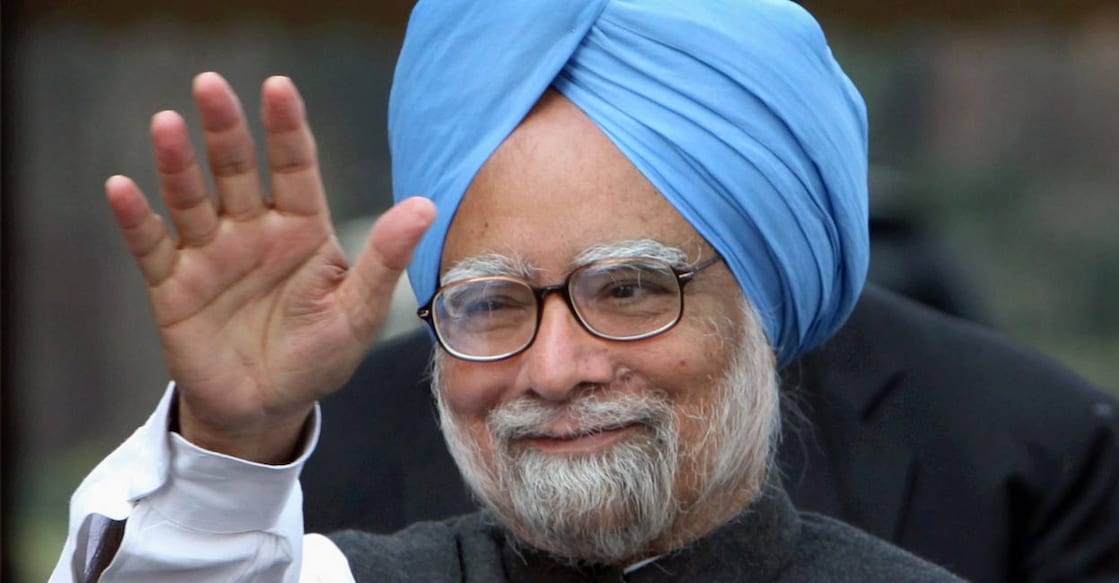A good man in politics, Manmohan Singh combined steely resolve with integrity

Mail This Article
Dr Manmohan Singh was that rarity of rarities, a good man in politics. He was never a politician. For he brought to politics a decency and integrity that is unmatched.
But he was a leader and a most uncommon leader at that. A leader who changed India.
Any leader operates between a given past and his vision of the future. MMS had both. He had vast experience of how India and its government worked and knew how it had become what it had. But equally,he had a vision of what India could be.
As a leader, he was ambitious, not for himself but for India and its people. Not for a small India, divided by religion or language, or afraid of other countries’ progress. His was not the short-term election cycle calculation of individual political gain. His was a practical vision of how to better the lives of his fellow citizens.
He was ambitious for an open, democratic, confident India where every Indian has the opportunity for a better life. And he did more to make that possible than most. No Indian leader has done more to pull his fellow citizens out of poverty. If his term as Finance Minister opened the door to the Indian economy’s high growth years, his terms as Prime Minister sought social equity through the Mahatma Gandhi Rural Employment Guarantee Act, 2005. His governments passed landmark legislation giving Indians the right to food, work, and education. And the Right to Information Act, 2005, gave ordinary Indians transparency in governance.
As for the world, he built imaginatively on what PV Narasimha Rao and Atal Behari Vajpayee had begun to realise an India that took its place in the world with pride. As he said in his farewell address as prime minister on 17 May 2014,”I am confident about the future of India. I firmly believe that the emergence of India as a major powerhouse of the evolving global economy is an idea whose time has come…this Nation of ours can show the way forward to the world.” This was the patriot speaking from his heart.
I have personally seen the respect in which he was held and the way in which his words were heard and heeded by the most powerful leaders of the world and in forums like the expanded G-7, the G-20 and the East Asia Summit. US President Obama once called him his guru.
At heart, he wanted to use the world’s potential to transform the lives of Indians. What he did to “make borders irrelevant” in the subcontinent resulted in one of the best periods in our relations with our neighbours. He was also successful in stabilising the border with China during rapid changes in the international system and when China became increasingly assertive in its behaviour on its periphery. To simultaneously transform the relationship with the US, epitomised in the civil nuclear cooperation agreement and NSC waiver of 2008, was truly a historic achievement. He was also successful in adding economic and political substance to India’s ‘Look East’ policy. The first-ever defence agreement with Japan and close economic ties with South Korea were the result.
I once asked him why successive governments of India kept returning to the table with Pakistan when its behaviour sponsoring cross-border terrorism made it so difficult. His answer was that it served India’s enlightened self-interest, for the alternatives, equating ourselves with Pakistan, would be to fall into their trap, would consolidate the hold of anti-Indian elements in Pakistan, deepen communal fissures in the subcontinent, and give the world a lever and role in our affairs and neighbourhood that was best avoided.
His professorial manner, decency, and integrity covered a steely determination, as I discovered in the long and tortuous process of seeing the civil nuclear agreement with the USA through to completion. At one stage in early 2008, when we had an agreed text of the 123 agreement but no clear prospect of it being approved in the coalition government, we negotiators suggested that we cut our losses and call off the deal sooner rather than later to avoid further damage to our international reputation and relations with the US and supportive partners. It was Dr Manmohan Singh who stood firm and insisted that we continue, and was willing to risk the future of his government to keep his given word.
It was the same determination combined with decency and his proven track record of keeping his promises that persuaded people to walk the path to the future with him. The UPA’s victory in the general election of 2009 was a vindication of his politics and vision. His was a time when Indians and the world believed in India’s future. It wasn’t hype, as the world and Indians proved by their behaviour that India had a real shot at becoming a prosperous and secure country with a place for all its citizens. Unprecedented numbers of Indians in the diaspora returned to India, as did many of our students abroad. One reason was that Dr Manmohan Singh kept his word and created outcomes in India. And in so doing, he was large-hearted and confident enough to give credit to his predecessors.
After he announced that he would not be seeking reelection in January 2014, he said in a press conference: “I honestly believe that history will be kinder to me than the contemporary media or, for that matter, the opposition parties in parliament.” He was right, again.
Dr. Manmohan Singh must and will be counted among the makers of modern India.
Shivshankar Menon, a former diplomat, served as the National Security advisor during Manmohan Singh's tenure as the Prime Minister of India.

